
views
Handling Friendly Teasing

Pause and try to see the joke. If your friends are good friends, their teasing is probably meant kindly. Before you react, listen to what they are saying and think about why they are saying it. Ask yourself how you feel. Do you feel loved and known? Do you feel like your friend likes you? This is friendly teasing, and it's a good idea to react in a friendly way. If you feel like your friend doesn't like you, pay attention. That might mean that the teasing is unfriendly.
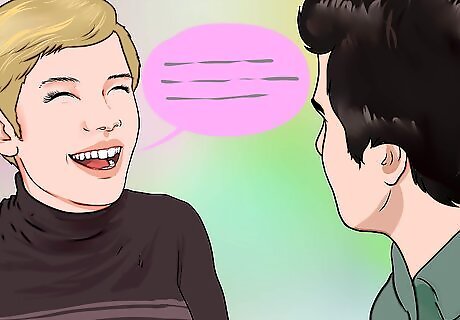
Have an effective comeback. You can make a joke back about yourself, your friend, or anything else, as long as it's also friendly. Having a comeback can show others that you have the strength to stand up for yourself in a positive way. Make sure that your comeback is not at anyone else’s expense, including your own. The purpose of the comeback is to stop the teaser from continuing to tease you any further. You can dismiss their joke by saying, “Thanks but I’ve heard that line before.” Then just walk away or move on to a different topic without any further attention given to the situation. Avoid teasing the teaser back. Instead of sinking to their level, be the bigger person. You can agree in a joking way. If your friend says "Hey sleepy, falling asleep at lunch again?" You can say "Yeah, that's me, Sleepy." If you aren't hurt, but you don't really like the joke, just smile but don't say anything. Your smile will tell your friend that you aren't upset, but it won't give them more material to tease you with.
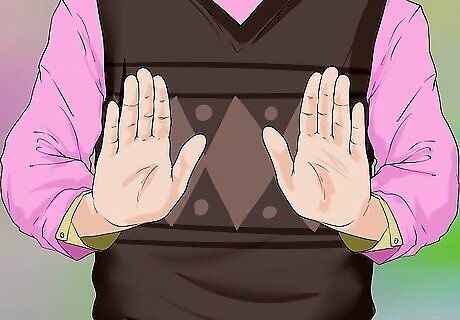
Calmly and confidently ask them to stop. If you don't like the teasing, explain how you're feeling. Stay calm and confident while you speak by taking a deep breath, holding your head high, and standing up straight. Smile, and check if it feels natural to smile. Then say "You're very funny, but I don't feel like being teased right now. Let's talk about something else, okay?"
Stopping Unkind Teasing

Stay calm. You can feel upset, but it will help you communicate if you don't lose your temper and start yelling or crying. If you feel anger, take a deep breath and count to ten. In your head, remind yourself to relax: think "Be easy," or "You can relax." It can help to say your own name silently. You should usually let your friends know how you feel, but if you have a friend who is turning out to be a bully, avoid revealing your hurt feelings. Let them know that you aren't hurt, but that you don't think they're being funny. If they say something insensitive, you can say "I feel like if you really thought that, you would ask me about it in private instead of making jokes."
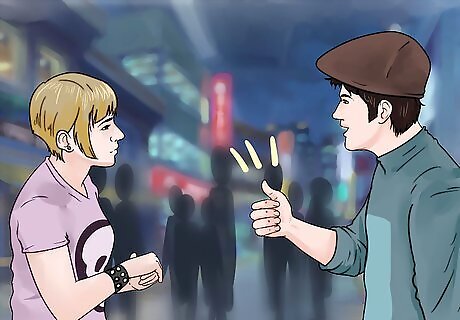
Shut them down with quick sarcasm. Let your friend know that you don't find their teasing amusing. You don't have to act serious—you can just raise your eyebrows, or say something slightly sarcastic, like "Oh sure, you got me there." You can change the topic if you know you have something more captivating than your friend's teasing. If you don't, try sighing and saying "Does anyone want to talk about something more…uh…interesting?" Tease your friend back for talking about you so much. Say "You think a lot about my outfits, don't you?" If they come back with an insult, just smile and say something like "Whatever you say, personal stylist." Tell your friend later in private how you feel. Sarcasm can turn nasty over time—you don't want to communicate that way for too long.
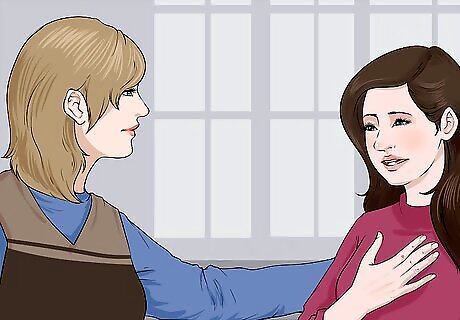
Explain your reaction. If your feelings have been hurt, it will probably show in your face. You might snap, or even cry. If this happens, explain how you feel. Your friend should respect you and listen—if they don't, walk away. Explain why you reacted. "It's not what you said—what you said isn't true. I'm hurt that you would say it, though." When you address your friend, use "I" statements instead of accusing them of anything. It will help you and your friend stay calm. You can say "I feel hurt when you tease me about this. I never like jokes about this subject."

Set a boundary with your friend. When you are alone with your friend, explain to them that you really don't like the kind of teasing they were engaging in. Draw a boundary by telling your friend exactly what you want them to do. Set a consequence by saying what you will do if they cross your boundary. For instance, you might say "I don't want you to talk about my family in public, especially when you're making jokes or bringing up things we are struggling with." This is a boundary. To set a consequence, explain what you will do if they cross the line again. "If you talk about my family in a way I don't like, I will not hide that I am upset with you. If you keep going, I will leave the conversation. If you do it repeatedly, I will end our friendship." Follow up. If they cross your boundaries, give them the consequences.
Don’t blame yourself for your sensitivity. If you feel upset when you’re teased and feel like you’re always the butt of the joke, try to realize that your sensitivity isn’t your fault. It isn’t your fault if friends or family members are too harsh, verbally cruel, and judgmental. Remember that you have every right to stand your ground and tell someone to stop when they’re being mean to you.
Getting Out or Getting Help

Reach out to your friends who don't tease you. If you have a problem with a friend who always teases you, let all your friends know that you don't like it. Explain that you feel pushed out of friend group by this person. Ask your other friends to intervene. Talk to the person you are closest to first. If your closest friend is the one who is teasing you, talk to someone else who likes you and isn't closer to the teasing friend. Explain that you want to keep hanging out with all your friends, but that the friend who is bugging you makes you feel like it's not worth it. Reach out to other friends who are being teased. If you stick up for each other, your teasing friends will back off.

Speak to an authority figure. If your friend or friends are repeatedly teasing you in ways that make you feel bad, even though you have asked them to stop, that is bullying. If they mimic you, or make unkind faces or gestures at you (like eye rolling) it is called "social bullying" and it's as real as any other kind. Talk to your parents, older friends, and your teacher or supervisor. If the bullying doesn’t stop, report it to the principal where you go to school, or the boss where you work.
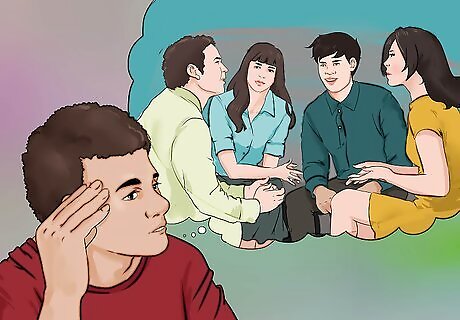
Find better friends. If your friends are really trying to make you feel bad, they aren't your friends. If you tell your friends how they feel, and they ignore you and cross your boundaries, move on. Friendship is about respect and kindness. Reach out to people you think are nice, or consider transferring to different activities so that you can meet new people. If your friends reach out to you after you leave them, let them know what you expect before you come back. Tell them that if they cross your boundaries with mean teasing, you will leave for good.




















Comments
0 comment